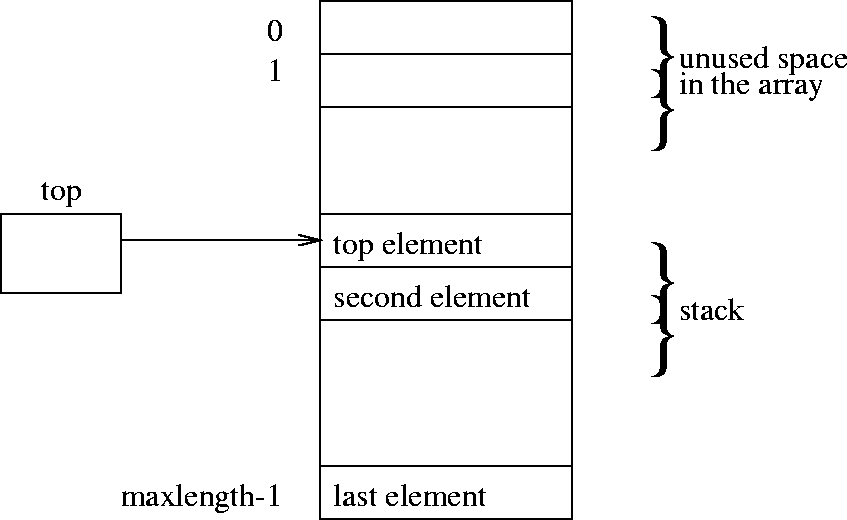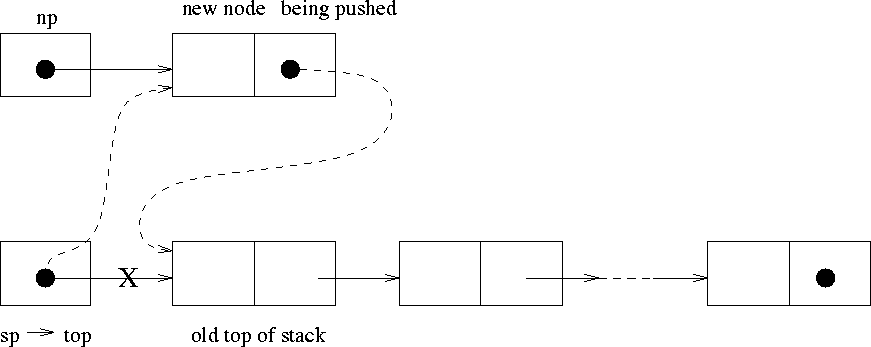


Next:2.4
QueuesUp:2.
ListsPrevious:2.2.3
Doubly Linked List Implementation
2.3 Stacks
-
Stack is a special kind of list in which all insertions and deletions occur
at one end, called the top.
-
Stack ADT is a special case of the List ADT. It is also called as a LIFO
list or a pushdown list.
-
Typical Stack ADT Operations:
| 1. |
makenull (S) |
creates an empty stack |
| 2. |
top (S) |
returns the element at the top of the stack. |
| |
|
Same as retrieve (first (S), S) |
| 3. |
pop (S) |
deletes the top element of the stack |
| |
|
Same as deletes (first (S), S) |
| 4. |
push (x, S) |
Insert element x at the top of stack S. |
| |
|
Same as Inserts (x, first (S), S) |
| 5. |
empty (S) |
returns true if S is empty and false otherwise |
-
Stack is a natural data structure to implement subroutine or procedure
calls and recursion.
-
Stack Implementation : Arrays, Pointers can be used. See Figures
2.5
and 2.6
Figure 2.5: An array implementation for the stack ADT
 |
Figure 2.6: A linked list implementation of the stack ADT
 |
-
Pointer Implementation of Stacks: The following code provides functions
for implementation of stack operations using pointers. See Figures 2.7
and 2.8 for an illustration of push
and pop operations on a linked stack.
typedef struct node-tag {
item-type info ;
struct node-tag * next ;
} node-type ;
typedef struct stack-tag {
node-type * top ;
} stack-type ;
stack-type stack ; /* define a stack */
stack-type * sp = & stack ; /* pointer to stack
*/
node-type *np ; /* pointer to a node */
/* makenode allocates enough space for a new node and initializes
it */
node-type * makenode (item-type item)
{
node-type
*p
;
if ((p = (node-type *) malloc (sizeof
(node-type))) = = null)
error (``exhausted memory'') ;
else {
p  info = item ;
info = item ;
p  next = null ;
next = null ;
}
return (p) ;
}
/* pushnode pushes a node onto the top of the linked stack
*/
void pushnode (node-type *np, stack-type
*sp)
{
if (np = = null)
error
(``attempt to push a nonexistent node'')
else {
np  next = sp
next = sp  top ;
top ;
sp  top = np
top = np
}
}
void popnode (node-type * *np
; stack-type *sp)
{
if (sp  top = = null)
top = = null)
error (``empty stack'') ;
else {
*np = sp  top ;
top ;
sp  top = (* np)
top = (* np)  next ;
next ;
}
}
Figure 2.7: Push operation in a linked stack
 |
Figure 2.8: Pop operation on a linked stack
 |
/* push-make a new node
with item and push it onto stack */
void push (item-type item ; stack-type *sp)
{
pushnode (makenode (item), sp) ;
}
/* pop-pop a node from the stack and return its item */
void pop (item-type * item, stack-type *sp)
{
node-type * np ;
popnode (& np, sp) ;
* item = np  info ;
info ;
free (np) ;
}



Next:2.4
QueuesUp:2.
ListsPrevious:2.2.3
Doubly Linked List Implementation
eEL,CSA_Dept,IISc,Bangalore



